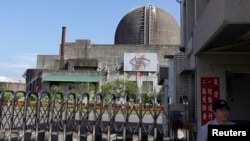Taiwanese officials want to ship the island's nuclear waste offshore as spent fuel accumulates at two older power plants, but the plan faces opposition from activists and the legislature, putting it on hold.
The two oldest of Taiwan’s three nuclear power plants are running out of space for spent fuel. The build-up of waste prompted government-run Taiwan Power Company to call in February for bids from companies overseas capable of removing the fuel, neutralizing radioactive material and helping to dispose what's left. Firms in France, Japan, Russia and Britain are technically able to do the work, though none had tendered bids.
A month later the power company retracted its call for bids to process 1,200 bundles of spent fuel because parliament declined to approve a $367 million disposal budget. Taiwan Power spokesman Lin Te-fu said the company will try to persuade legislators again to allocate the money or risk a storage crisis at the island’s first nuclear plant.
He said Taiwan Power will strive for parliament's understanding. The spokesman added that if the disposal project is stopped again, at some point in the future Taiwan's No. 1 nuclear plant will not be able to continue operating.
Lin said Taiwan has the option of moving the spent nuclear fuel to dry storage on the island, but that it could not proceed until the government approves a water protection plan.
While some legislators believe the overseas disposal cost is too high, leaders in Taiwan's popular movement against nuclear power cite other risks. They call it irresponsible to ship potentially hazardous plutonium and uranium to other countries, possibly causing environmental damage or landing the material in the hands of terrorists. Taiwan-based Green Citizens Action Alliance researcher Hsu Shih-ya fears the waste would contaminate foreign soil.
Hsu said the kind of disposal method proposed would cause a high level of radiation pollution surrounding the treatment plants. She said her group does not want Taiwan's pollution to be transferred to other countries, which would be a very immoral matter.
Opposition to Taiwan's nuclear power crested last year after more than 200,000 activists marched in the streets, leading the government later to call off plans to open a $9.3 billion fourth plant. Taiwan's other plants date to the 1970s and contribute 12 percent of the industrialized island's power generation. Fossil fuel imports are the chief source of power, but the government calls those costly and polluting.
Opponents of nuclear power are now asking that Taiwan not send nuclear waste overseas. Hsu Hsin-hsin, spokeswoman for the Central Taiwan Antinuclear Action Alliance, said the plan would cost too much without answering calls to end nuclear power.
A tough debate may loom in parliament. One senior ruling party lawmaker, Tsai Chin-lung, is still trying to decide how he might vote.
Tsai said the matter depends on how the other party would do waste disposal. He adds that Taiwan Power obviously wants to carry out this task but that Taiwan itself has no way to do waste treatment.
Taiwan Power will work on persuading legislators to approve a budget for overseas nuclear waste treatment before parliament goes into recess in mid-year.




